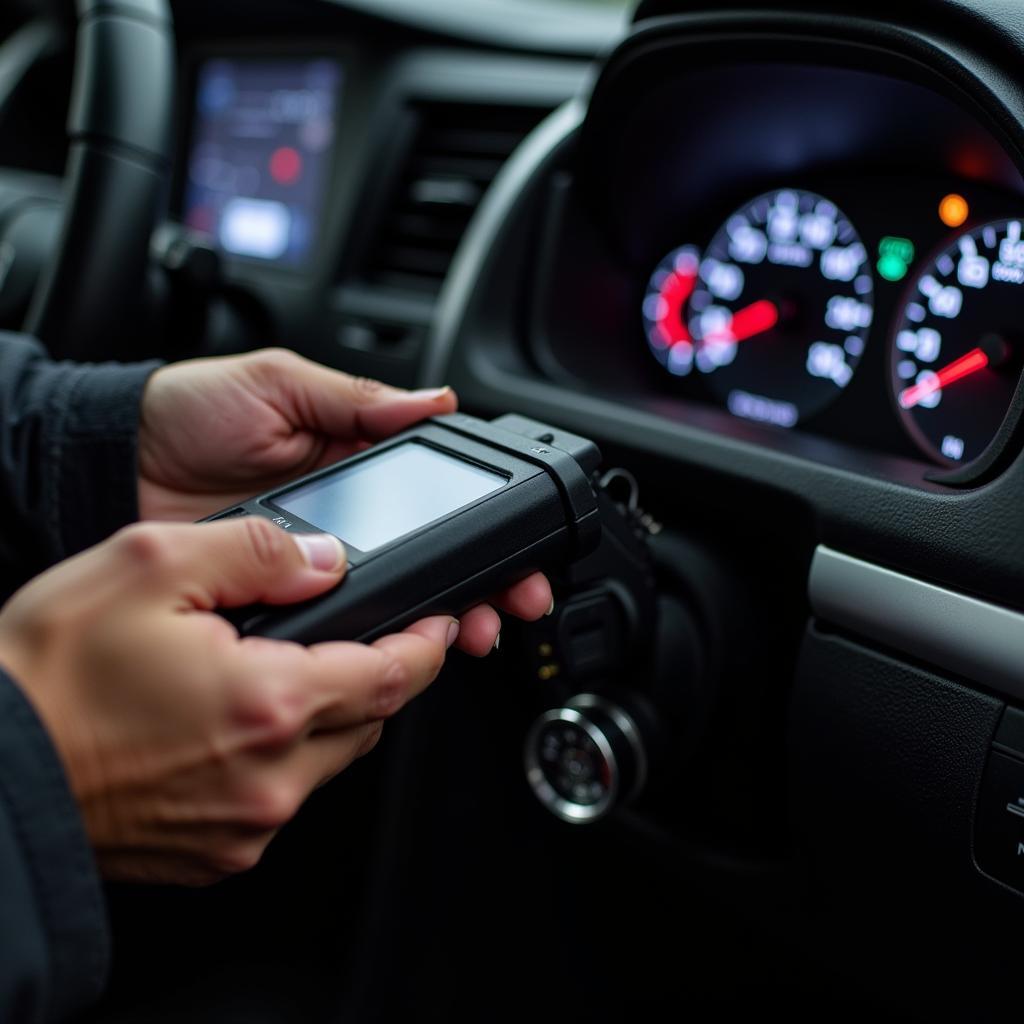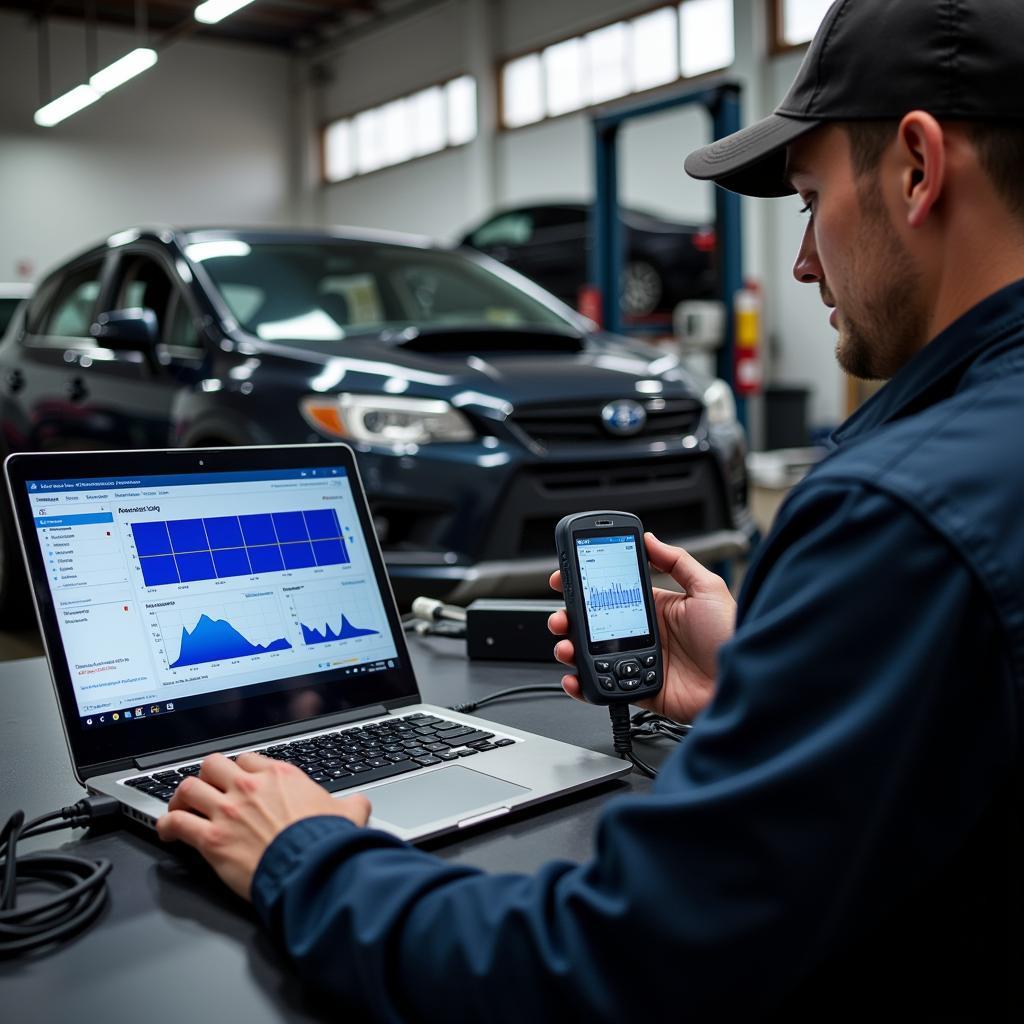Finding the Best Diagnostic Car Tool can feel like navigating a maze, especially with the overwhelming options available. Whether you’re a seasoned mechanic or a DIY enthusiast, having the right tool to diagnose car problems can save time, money, and unnecessary headaches. This comprehensive guide will equip you with the knowledge to make an informed decision, ensuring you drive away with the perfect diagnostic tool for your needs.
Understanding the Importance of a Quality Diagnostic Car Tool
Before we delve into the specifics, it’s crucial to understand why investing in a quality diagnostic car tool is non-negotiable for any car owner. A reliable diagnostic tool acts as your personal car doctor, translating cryptic engine codes into understandable diagnoses. This empowers you to:
- Identify car problems early: Detect minor issues before they escalate into major (and expensive) repairs.
- Save money on mechanic fees: Armed with accurate diagnoses, you can confidently tackle repairs yourself or negotiate effectively with mechanics.
- Improve your car’s performance: Regular diagnostics help you maintain optimal engine health, leading to better fuel efficiency and a smoother ride.
 Mechanic Using a Diagnostic Tool
Mechanic Using a Diagnostic Tool
Types of Diagnostic Car Tools: Finding Your Perfect Match
The market offers a diverse range of diagnostic car tools, each catering to different needs and budgets. Here’s a breakdown of the most common types:
1. Code Readers:
Ideal for: Budget-conscious users who want a quick and easy way to read and clear basic engine codes.
Key Features:
- Read and clear DTCs (Diagnostic Trouble Codes): These codes are your car’s way of telling you there’s a problem.
- Compact and portable: Easy to store and use on the go.
- Affordable: An excellent entry-level option for casual users.
2. OBD2 Scanners:
Ideal for: Car owners who want more in-depth information than basic code readers provide.
Key Features:
- Access live data stream: Monitor your car’s performance in real-time, including engine RPM, coolant temperature, and oxygen sensor readings.
- View freeze frame data: Capture a snapshot of your car’s sensor readings at the time a fault code was stored.
- Perform some bi-directional controls: Test certain components, like turning on the cooling fan.
3. Professional-Grade Scan Tools:
Ideal for: Professional mechanics and serious DIYers who demand advanced functionality and comprehensive diagnostics.
Key Features:
- Advanced coding and programming: Modify car settings, such as key fob programming and injector coding.
- Comprehensive vehicle coverage: Diagnose a wide range of makes and models, including domestic, Asian, and European vehicles.
- Extensive technical support: Access manufacturer-level data and troubleshooting resources.
 Professional Diagnostic Setup
Professional Diagnostic Setup
Factors to Consider When Choosing a Diagnostic Car Tool
With the vast array of options available, choosing the right diagnostic car tool can seem daunting. To simplify your decision-making process, consider these essential factors:
1. Your Budget:
- Entry-Level: Basic code readers and budget-friendly OBD2 scanners (under $50) are perfect for casual users.
- Mid-Range: OBD2 scanners with live data and some bi-directional controls range from $50 to $200.
- High-End: Professional-grade scan tools with advanced features can cost several hundred to thousands of dollars.
2. Your Skill Level:
- Beginner: User-friendly interfaces and simple menus are crucial for beginners.
- Intermediate: Look for tools with more advanced features, like live data graphs and troubleshooting guides.
- Advanced: Professional-grade tools offer the comprehensive functionality and technical data required for complex diagnostics and repairs.
3. Vehicle Compatibility:
- OBD2 & EOBD Compliance: Ensure the tool is compatible with your car’s On-Board Diagnostics system. Most cars manufactured after 1996 in the US and 2001 in Europe are OBD2 compliant.
- Make and Model Specific Features: Some tools offer enhanced functionality for specific car makes and models.
 Mechanic Using Laptop for Research
Mechanic Using Laptop for Research
Maximizing Your Diagnostic Tool’s Potential: Tips and Tricks
Choosing the right tool is just the first step. Here are some expert tips to maximize its potential:
- Regular Software Updates: Keep your diagnostic tool’s software up-to-date to ensure optimal performance and access the latest features.
- Utilize Online Resources: Numerous forums, communities, and manufacturer websites offer valuable information on troubleshooting codes and interpreting data.
- Practice Makes Perfect: Familiarize yourself with your tool’s features and practice using it regularly.
Conclusion
Investing in the best diagnostic car tool is a smart decision for any car owner. By understanding your needs, researching the available options, and utilizing the tips in this guide, you can confidently diagnose car problems, save money, and enjoy a smoother, hassle-free driving experience.
FAQs
Q: Can I use a diagnostic car tool on any car?
A: While most modern cars are OBD2 compliant, it’s crucial to check your car’s manual or consult with the tool manufacturer to ensure compatibility.
Q: Do I need a professional mechanic to use a diagnostic car tool?
A: Many diagnostic car tools are designed to be user-friendly, even for beginners. Choose a tool that aligns with your skill level.
Q: How often should I use my diagnostic car tool?
A: It’s recommended to run a diagnostic scan at least twice a year or whenever your check engine light illuminates.
Need Help Choosing the Right Diagnostic Tool?
Finding the perfect tool can be overwhelming. Contact us on WhatsApp: +1(641)206-8880 or Email: [email protected]. Our 24/7 customer support team is here to help you make the best choice. You can also explore our in-depth reviews of the best car diagnostic tool 2023, the best professional car diagnostic tool, and the best car diagnostic scanner price to find the perfect tool for your needs. For specific functionalities, explore our guides on the best professional car diagnostic tool for programing or even revisit the classics with our review of the best car diagnostic tool 2015.

Leave a Reply